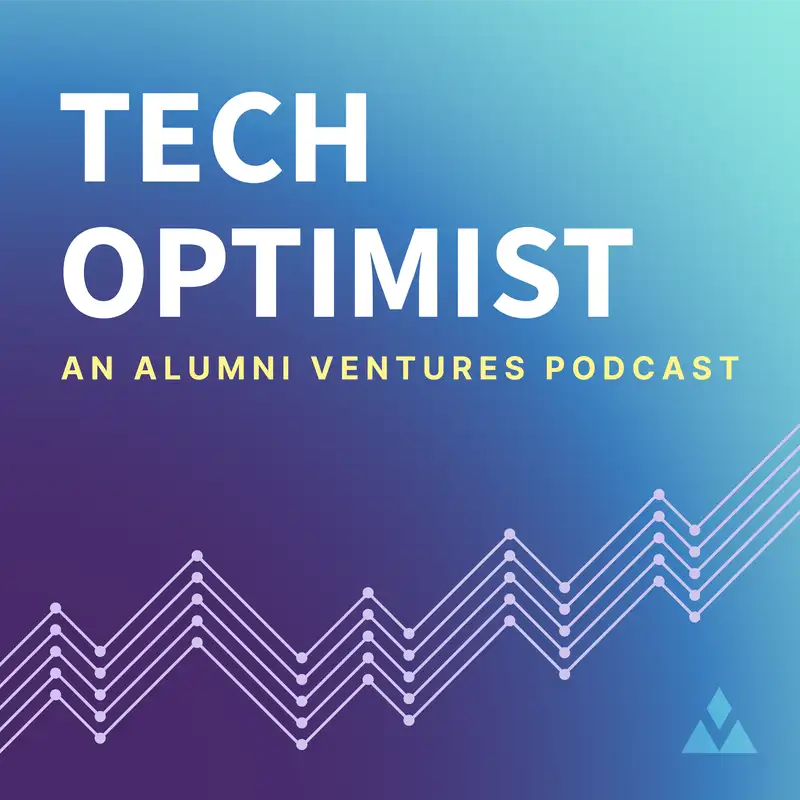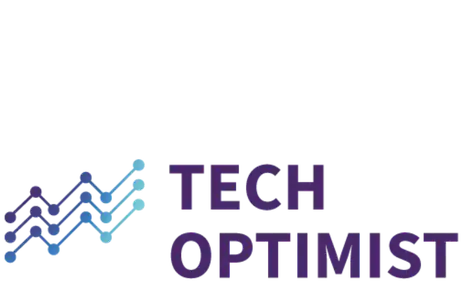#13 - Three Breakthroughs: College Sports Turn Pro, Miles Per Gallon Becomes Outdated, and Ethereum ETFs
Drew Wandzilak (00:07.342)
Perfect. Welcome to the Tech Optimist podcast. This is our segment on the three breakthroughs in science, technology, where we try to narrow in on three breakthroughs that will have an impact on the world around us. How you doing, Mike?
Mike (00:22.547)
Good. So I'm the founder and CEO of Alumni Ventures. We're a venture capital firm that's now been around about a decade. one of the most active venture capital firms in the world. We exclusively co -invest, but we co -invest alongside kind of brand name leading venture capital firms. So we try to be a co -investor of choice, if you will. So every year we do two to 300 investments. So we see a lot of stuff and I'm joined by.
Somebody who's just getting started in the business drew Wonsalai.
Drew Wandzilak (00:56.046)
one of the minions on the factory floor.
Mike (00:58.451)
There you go, but a well -loved minion. But okay, so drew three things. I think I'm going first this week, right?
Drew Wandzilak (01:09.742)
You are first.
Mike (01:11.635)
So, and we have not, this will be a surprise to you. My first is really the settlement about division one sports. I think, you know, we have, this has been coming now for a while, but, you know, I think we're heading toward a period of kind of shaking things up.
Drew Wandzilak (01:22.83)
Hmm.
Mike (01:37.651)
which always leads to kind of great investing opportunities. So, you know, this, this, monopoly, if you will, that the NCA, NCAA has had over college athletics, that damn seems to have been, to have been broken and, you know, moving kind of beyond NIL to what seems to be a
a new world where athletes, especially athletes in profit center sports such as football and basketball are going to be compensated. So, you know, you start with this basic idea of, is this a big business? Yes. Is this a business that is going to endure in a AI robotic world? Yes. People are still going to want to go.
To see Northwestern on a beautiful Saturday afternoon, you know, in their brand new stadium, for sure. And so I think this opens up opportunities for entrepreneurs and investors to participate in the new world. And so yeah, that's number one. Any, any thoughts or comments on that?
Drew Wandzilak (03:00.098)
Well, for our viewers and our listeners, this is coming from a former Division I college athlete. I don't know if we have the...
Mike (03:09.171)
yeah, marginal, marginal division one college athlete, but I did get to cover Michael Jordan. Thank you for bringing that up, Drew, who, you know, dropped, 48 on this guy. so yes, yes, I still love sports and,
Drew Wandzilak (03:27.47)
We're good.
Drew Wandzilak (03:31.662)
We might have to get the VCR out of the basement so we can run that. We can run that as B -roll. Yeah.
Mike (03:33.875)
Yeah, I think, I think B -roll, B -roll of my blocking Michael Jordan is clearly needs to be B -roll. And if you, if you look closely at the B -roll, you'll see though a foul was called, it was all ball and was recognized by MJ with a slight tap on my backside indicating, yeah, you got me. So that will definitely have to be inserted into the tech optimist.
Drew Wandzilak (04:03.438)
Yes. Well, exactly. And then going back to your point, so I mean, this is obviously I think both of us have been looking at this pretty closely. We're both sports fans and it hits a little bit close to home. Can you touch more maybe on what this settlement was? Because it was a pretty it felt like a pretty seminal moment, either the start or, you know, towards the end of kind of how this landscape is changing. What actually happened here?
Mike (04:03.699)
Be raw.
Mike (04:31.667)
Yeah, I mean, basically they got sued and instead of going to court where it may have been completely set aside, there had been some signaling from the Supreme Court actually that what the NCA was doing with individuals looked a lot like antitrust and a bunch of other things that kind of our system doesn't allow. And, you know, just historically for a lot of
you know, reasons, let's treat, we all love college football, so let's keep that. Or, you know, we all love baseball, so let's let them create a monopoly. That has happened in our American society from time to time. But, you know, this was a case where, you know, we were starting to see some...
lawsuits happening and some settlements and the NCA just trying to kind of preserve as much of it as they can, as long as they can. And this was just another case of, you know, a settlement that is staying in front of it. But it, with every settlement, we move closer to a marketplace where individuals are free to be paid for their services and
You know this patina that you know, big five college football isn't a business was frankly a joke. You know, preserving an under this you know patina of student athletes. So yeah, another settlement and another move toward you know that this is the portal.
Athletes moving around every year is kind of a new recruiting game. More and more direct payment for athletes directly to play at a college or university. In a you know, I'm and I'm not saying even I like it or personally, or that it's not going to be. Problematic for the way things have been done historically, I just observed that this is what's going on.
Mike (06:49.075)
And as a venture capital investor, it's going to create opportunities for entrepreneurs and new businesses and investors. And that's really, you know, that's the nail with which I drive my hammer. So I'll just leave it at that. It's a big deal. It's an announcement. It's an opportunity.
In future parts of Tech Optimist and AV webinars, we'll dive very deep into our theories about how we're going to address it. We have a sports fund, for example. I'll leave it to that team to share some of our reads on kind of what this means, how we're going to invest in it, where we think the puck is heading, quote unquote. So yeah, so first one, NCAA.
Your turn. Big breakthrough of the week, Drew.
Drew Wandzilak (07:42.638)
Big deal.
Big breakthrough, we'll say little to medium breakthrough, but what if I told you that we were thinking about fuel efficiency in totally the wrong way? So I saw this recent report that basically was anti -MPG. So you know that miles per gallon, you see it right on the sticker. And it really was this focus of this is probably the wrong metric that we should be using when we think about fuel efficiency.
Mike (07:56.051)
Okay?
Drew Wandzilak (08:14.126)
And let me kick this off with a little bit of a pop quiz and see if you get this right. Most people get it wrong, so be ready. But let's say I swapped out a 25 MPG car, so an old Camry or whatnot, for a 50 MPG car. I got a new Prius. Or I had a 10 MPG truck and I switched it out for a 15 MPG truck. Which one would actually be saving more fuel?
Mike (08:39.251)
Yeah, I mean, obviously that's a going to be a trick question, but one would think if the measure was good when you go from 25 to 50, that would be a better environmental choice. A more fuel efficient choice, right? One would think. Yeah.
Drew Wandzilak (08:55.406)
What one would think, and it is still a measure of efficiency, how efficient your vehicle is with the fuel that it's using. But if you think about how much fuel is used over a hundred mile period, the 25 MPG vehicle uses about four gallons over the hundred miles and the 50 uses about two. You have a two gallon of fuel savings in that adjustment, even though it's a 25 mile per gallon increase. And then with the 10 to 15, think of your big trucks on the road.
Mike (09:01.331)
Mm -hmm.
Mike (09:07.987)
Mm -hmm.
Mike (09:24.499)
Mm -hmm.
Drew Wandzilak (09:25.614)
Well, the 10 mile per gallon takes 10 gallons of fuel to go 100 miles. And the 15 takes like 6 .7 gallons of fuel. So it's a 67 % difference in fuel saved. So why does any of this matter? I'm not just trying to throw circular math at you, but because if we can change how we think about fuel standards and efficiency, it changes how policy gets created. And I think that's really important. And it's the public perception of this.
Mike (09:34.771)
Mm -hmm. Mm -hmm.
Mike (09:40.627)
Yeah. Yeah.
Drew Wandzilak (09:55.886)
And traditionally, we've been looking at MPG and we've been going, hey, how can we get this 45 MPG vehicle to 60 or 70? Right. How can we get our really efficient cars more efficient? But really, if we want to focus on reducing the amount of fuel we use as a society, we should be focusing on the lowest rung MPG vehicles, because even small differences in increased efficiency, we have a massive impact on the amount of total fuel.
that's used. The UK has started to add this. You can even see this on new cars. When you look at the sticker, there is this new metric. It's called GPHM. It's gallons per 100 miles. But I thought just a really interesting, yeah.
Mike (10:40.371)
I know. I think, listen, I think it's an interesting thought. I will share that we went through a similar period a long time ago when we were really concerned about tailpipe emissions, right? And where you really got the bang for your buck is literally paying people to stop driving their old crappy cars that just totally, you know, or, you know,
You had an old lawnmower that put more nasty stuff into the atmosphere than five brand new cars. So I think, I think it also points to the number of measurements that we are using. The KPIs we are using in our society are really outdated.
and not always effective and can sometimes lead to bad policymaking. There are discussions going on with GNP, gross domestic product. Is that really capturing what's going on? Does the GNP take into account how different levels of wealth?
because you can have GNP growing and people at the top half of the economic spectrum are getting 90 % of the benefits of the GNP growth because of the way it's measured. So I just think it's, I think you bring a really good example of a bigger issue that I think.
you know, entrepreneurs and investors and society as a whole should really be thinking about is what are you measuring and is it the right thing? And, you know, the old chestnut, you're going to get what you measure. I think it's a really good reminder of that. So good one. All right. So for the third.
Drew Wandzilak (12:50.478)
Cool, back to you, Mike.
Mike (12:56.787)
big breakthrough. This is the news around kind of Ethereum ETFs. And so again, whether, you know, that being approved earlier in the year that, you know, ETFs for Bitcoin were approved. And now there's kind of a roadmap here for them being approved for Ethereum as well. And I think the announcement,
Again is the announcements, the announcement, but you know, this seems to be kind of the disruption that is taking place slowly and, but pretty profoundly. And, you know, I think you go through with all of these kinds of crypto things we've gone through, you know, booms and busts and hype cycles and craziness and.
But the fact that both Bitcoin and Ethereum are going to have ETFs that people can buy on Schwab and Fidelity and are offered by BlackRock and iShares, it is a big deal. To me, it means that we've crossed the chasm of acceptability and that the genie...
When there's an ETF for something on Schwab, that genie does not get put back into the bottle. And, you know, I saw similar reports will probably put it up in the show notes, but again, really interesting statistics about, you know, who owns Bitcoin today is still the vast majority of it is being held by individuals.
but you are starting to see family offices, institutions that historically have been very conservative, dipping their toe in the water. And, you know, for an asset like Bitcoin in particular, which I would argue is just a, you know, digital gold, a repository of value with
Mike (15:22.323)
Supply constraints, I think, you know, it bodes again very very well for the future of those Categories over the next five ten twenty years So I think it's I Think the combination of you know The recent ETF approval for Bitcoin and now aetherium kind of on the heels of that
Again, I think in 10, 20, 30 years, I just think in a well diversified portfolio, you're going to have public equities and bonds and venture capital and real estate. And there is legitimately, even among the most conservative folks in the world, there's going to be a slice that's holding Bitcoin. And so I...
Again, a bit of a prediction there, but I think that that news, again, this feels to me like, you know, the frog being boiled, that this is something that just every year is just kind of creeping into acceptance more and more. So that's my third one.
Drew Wandzilak (16:37.358)
It's a big one. And I mean, I think there's probably a percentage of our audience here that didn't know what half the words you just used were. So, I mean, which is okay, which is okay. But what is the, I mean, I'll ask the simple question and ask you to explain it a little bit more. You know, I could buy Ethereum a year ago. What's kind of the big difference? Why is this such an important stamp of approval? Not just as a, as a market indicator.
Mike (16:45.587)
Yeah. It's okay.
Drew Wandzilak (17:06.702)
you know, from what the institutionals are doing. But me as an individual, you know, maybe I have a Coinbase account with some Bitcoin and Ethereum. What, you know, what's this going to do for me?
Mike (17:15.251)
For the people though, what this allows you to do is go on your Schwab account or your Fidelity account or wherever you, the average person manages their money and they don't have to mess around with a wallet. They don't have to mess around with, you know, this is a scary thing. Like FTX or, you know, Coinbase has been around a while pretty well established now, but it feels like, I manage all of my stuff.
through fidelity. And I know how to buy stocks. I know how to buy ETFs or mutual funds there. And I get, and I, and, and so this allows you to buy an ETF of Bitcoin with just the symbols that you, like you would buy, you know, the S and P 500 index through, you know, through an ETF like spy or something like that. So,
It just makes it much more accessible, much more. It feels like it's a much more legitimate thing because fidelity is going and buying the Bitcoin and managing it and things like that. And the ability to kind of buy it and sell it and kind of report it on your in your kind of traditional way that you manage your stocks and you manage your taxes. It's just another ETF you can buy now like you could for
you know, uranium or you could buy it for the standard and porous 500. So from a user standpoint, it just makes it so much more like just another asset you can buy and own. And you can buy and sell it, you know, report it on your taxes like you should, like all of your other investments.
Drew Wandzilak (19:04.974)
Great, fantastic. Yep.
Mike (19:05.907)
And Ethereum, while Bitcoin is kind of the original grandparent of this whole class, Ethereum is kind of one of probably the second most popular crypto product because it allows you to do things with it, like smart contracts and things like that.
Drew Wandzilak (19:22.958)
Mm -hmm.
Mike (19:35.283)
It was really designed to be kind of a part of the infrastructure of the crypto ecosystem that allows you to do more useful things with it. While Bitcoin itself is just a thing in and of itself. So again, think of it as just, you know, the ability to buy a fixed controlled asset like you would.
I want to buy gold as an inflation hedge. You can buy Bitcoin, but it's just that. It's, it's that thing where Ethereum is really more of a platform infrastructure technology that allows people to do things on top of it and the tech stack. so it gets the benefit of distributed ledger and all that fancy stuff that goes on.
But you can use it to solve a very practical human problem. So it is, it has become kind of the number two most popular crypto asset.
Drew Wandzilak (20:43.694)
Yeah, you use the comparison well. I mean, I think Bitcoin is the goal that's purely this kind of store of value and Ethereum is this development infrastructure environment. And the coin, the token itself is kind of what you use to facilitate transactions and movement within that environment. Similar to, I guess, if JavaScript or HTML or maybe even AWS is the other side of the analog came out with.
Mike (20:53.715)
I'm in. Yeah.
Mike (21:08.371)
Mm -hmm.
Drew Wandzilak (21:13.262)
their own currency. Cool. This is our three regulators. Now, I don't know when this is going to air, but we are on the verge of the NBA Finals. And so I hope maybe this airs either during or after, and we can see if we were right or wrong. But Mike, who is your NBA Finals winner this year?
Mike (21:14.707)
Yeah. Excellent.
Mike (21:34.707)
You know, I think.
think it's an interesting matchup, but I have to go with the Celtics. And I know you're a Celtics fan and I'm not, but you know, I do think that they have really from the beginning of the season, played the best most consistent basketball. Now that doesn't mean they're going to win it. But I, you know, I think they, yeah, if you're forcing me to pick a winner, I'm taking the Celtics. How about you?
Drew Wandzilak (21:43.79)
Hehehehehe
Drew Wandzilak (22:06.574)
I'm taking the Celtics.
Mike (22:07.923)
Yeah, that's just a bias pick though. That's not an analytical pick.
Drew Wandzilak (22:11.214)
We are already assuming a Celtics -Mavs matchup, so hopefully we are not wrong there.
Mike (22:17.779)
Yeah, so we are assuming the the Mavs and what I really like is I like the backstory here with Kyrie and talking trash and I think it's I think it's it's I hope it's Dallas in Boston because I think that would be a fun one to watch.
Drew Wandzilak (22:34.414)
It will be the TD Garden and will be a pretty electric place. It'll be rocking. It's going to be a fun series. Awesome. Thanks, Mike. Sounds good.
Mike (22:37.875)
Rocking. That'll be rocking. Excellent. We'll do it again next week. Thank you, Drew. See ya.







